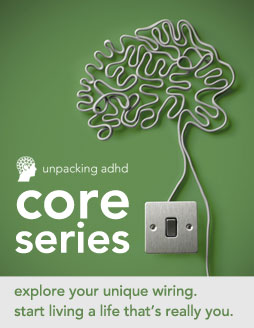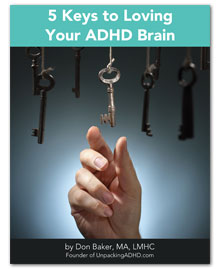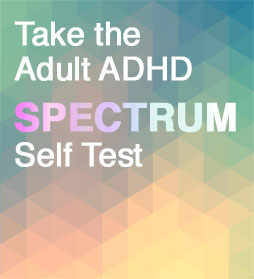Cynical about ADHD? I absolutely get it. But if you’ve ever thought the traits sound familiar, you owe it to yourself to take a closer look.
There’s no blood test for ADHD. Although brain scan studies have shown significantly different neurobiology in people with and without the diagnosis, there’s no scan to test definitively for ADHD. There’s only assessment and diagnosis by a medical professional.
The clinical label Attention-Deficit/Hyperactivity Disorder (ADHD) refers to people who struggle with being easily distracted, impulsive, and/or hyperactive. Other common traits include forgetfulness, emotional intensity, difficulty getting started on tasks, and disorganization in time or space. There are also many ADHD-related strengths, such as being exceptionally creative, intuitive, or charismatic.
Does any of that sound like you? Many people who recognize the traits, resist the label. Most are held back by pervasive myths about ADHD. Some believe ADHD is a fake diagnosis manufactured by pharmaceutical companies to peddle Ritalin, Adderall, and other multi-million dollar drugs. A lot of resistance stems from concerns about profit-driven overmedication of children.
I’m not here to defend pharmaceutical companies or advocate for ADHD medications. Many of my clients have found a well-informed mix of meds helpful. Others haven’t. But as an expert on Adult ADHD who has been living with the diagnosis myself since 1997, here’s what I can tell you for sure: knowing my neurobiological wiring is “different” has made all the difference in my quality of life.
This has been true for hundreds of people I’ve worked with over the past 15 years.
Here’s my message to adults with ADHD traits:
- You don’t have to pursue a clinical diagnosis or take medication to benefit from learning more about Adult ADHD.
- The point is not whether you fully accept the ADHD label. Maybe you’re just “ADHD-ish.”
- What matters is accepting, understanding, and making the most of your own unique brain wiring.
Because the truth is that people with a lot of ADHD-spectrum traits struggle. They feel different. They are different. There’s no such thing as “adult-onset ADHD.” People with this collection of traits have fundamentally different brain wiring that was evident from childhood.
The only truly respectful and helpful response to ADHD traits comes from a perspective of neurodiversity. That means recognizing that ADHD traits are at one end of the normal range of human behavior. People with these traits are different, not broken.
The goal isn’t to “fix” people with ADHD wiring and make them “normal” but to set each unique individual up for success. Everyone must create their own definition of success as part of the process, but essentially it’s about being able to get more of what you want out of life.
Achieving this requires a patient, curious, non-judgmental approach. If we toss out our entire conceptualization of ADHD, we lose out on insights and strategies that can be profoundly useful. Talk about babies and bathwater!
So, if you have ADHD-related traits, don’t worry about the label. Focus on whether you’re satisfied with your life:
- Do you feel stuck, like you’re not able to move forward?
- Are you often bored, restless, or frustrated?
- Do your traits cause problems in your career or relationships?
- Does your life feel more chaotic than creative?
- Could you benefit from connecting with others who have similar challenges and strengths?
If you answered yes to any of these questions, don’t let anything hold you back from getting the support you deserve to live a more satisfying life!
Consider signing up for Opening the Suitcase, my 4-week online course of information, support, and inspiration to get you started on a more hopeful, successful path. Get clear on what ADHD is, what it isn’t, and what that really means for you. Opening the Suitcase is the first course in the 3-part Unpacking ADHD Core Series.





Attending Don’s classes provided a rich and wide variety of ADHD information/education/resources, delivered in many engaging formats.
Exposure to this information + active support from other class members has made a huge difference in the quality of my life.
Highly recommended!
I second what Don says. Who cares about labels? Who cares what it’s called, whether it’s a diagnosis or just a place on the human spectrum? In my experience you need the ADHD label only when it is required at the pharmacy to dispense you the ADHD meds. But just knowing where you stand and what you live with and that it is dictated by your neurology and is not your fault – all of this can be hugely therapeutic! I came to this topic hugely skeptical of ADHD, always having said that the pharma companies are simply pathologizing childhood to earn the money. Approaching ADHD with an open mind really allowed to get immense help, regardless of meds. My life turned around since the start of my ADHD journey. Thanks to people like Don!
It is true the hardest part for adults with ADHD is accepting they have a condition perhaps never diagnosed in childhood. These traits you outlined affect several people I know. The happier ones have found outlets for their energy and creative juices. One in particular chooses to avoid all refined sugars and that seems to help him.
It hurts when to singled out, and for a very long time I had no hope.
One day I walked into a class ADHD 101, thinking since I had ADHD I knew everything about it.
Forever changed happened when I walked out of ADHD 101, I knew what Hope was. The Fog surround me that day was such a wealth on information that it took several months to get through it all.
I went on to complete the online courses and currently signed up for the 8-week traction group.
I once blame my ADHD for destroying my life, I had done as those around me had done and simply misunderstanding that too most is invisible disease. However, with compassion, empathy and love it has become a new available resource to those who ask, because parents, friends and family members of us with ADHD need help with translation, and chance to process new information. I think most people struggling to understand what it is to have ADHD typically are in roles where children are concern. Being and Adult with ADHD is not something most people come across, but someone who truly has had an opportunity to take classes find perspective and well connect the dots is even rarer. I feel right now I am one of few in the world that is an expert on ADHD. And so these classes and the development taking place with Don Baker is revolutionary, and I grateful every single minute that he had put together such an amazing resource for a community that does not have a strong support system.
Therefore, for those cynical about if ADHD does exist, well perhaps there is reason for caution. However is not it as important to have a safe supportive environment for people to not feel judged and explore and find their own answer. Even those struggling with cynical ideas have been rejected by another person and do know that pain. Therefore, so perhaps with that knowledge we redefine the anger that is driving these arguments and help to create a support system where people can openly ask questions and people like me can help to answer them. Communication is the key to connecting communities that truly both desire and need questions answered, and for the other side to have a safe place to grow, develop, and reach their full potential in life. Everyone deserves to be happy, and the frustration felt by both sides based on a misunderstanding.
Change takes place one person at a time, thank you Don!
Reply
We are a type; It is not a ‘disorder’, unless we accept that the contrived order of the world around us is what constitutes normality; if we accept that being ‘normal’, is being like those who are unlike us as we try to carry on in the synthetic way that is modern life (at least in developed countries) It is not a disorder, just like being gay is not a defect; although, much like ADHD – it interferes with a general and or traditional perception of what is considered social normal. Enough is enough. Accept who you are and make the world work for you for a change (I’m sure the world will be a better place for it).
Feel very low…. it appears that I have ADHD, dyslexia and dyscalcula… suffered terribly at school with very little help… it destroyed my professional career… I’ve never been able to pass word and number tests and have no qualifications…. never found a path in life and very few people understand….. people find me interesting and intelligent and then I let myself down by forgetting the simplest of things or making childish mistakes….. my enthusiasm overtakes my abilities and I end up being frustrated and disheartened with the world…. just want to hide from everything most of the time…….
Dear Don,
I don’t know if I’m just having a hard time or if I am super emotional because I am overwhelmed. I have felt different my entire life, mentally that is to say. I somehow managed to go nearly 40 years without being diagnosed with any particular psychological labeling. In my community diagnoses is frowned upon and is even met with disbelief by elders. I just know that my life is a shambles and it shouldn’t be as I am smart, intuitive and creative, but my brain is always switching gears a problem I’ve had since a child that I didn’t truly acknowledge until now. Thank you for your open letter.
Sincerely,
Simply’me
Thanks for responding, Simply’me. I appreciate your feedback.